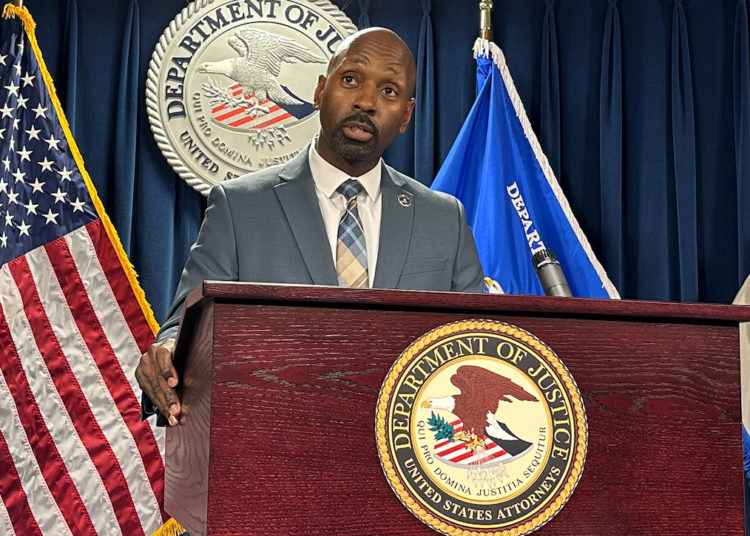It’s been about seven months since I last wrote about how debates over Israel and antisemitism are dividing the American right, and in some ways the latest cycle of controversy looks like the last round. Once again we’re debating the programming choices of prominent podcasters: In March the instigating event was Joe Rogan giving a platform to Ian Carroll, a propagator of perfervid critiques of Israel; this time it’s Tucker Carlson giving a platform to Nick Fuentes, the Hitler-admiring leader of the so-called groyper right.
Because Carlson sits closer than Rogan to the center of the Trumpist G.O.P., his Fuentes episode has set off a more dramatic intra-conservative war. But in each situation there are similar questions at work: How do you gatekeep a tendency — anti-Israel sentiment sliding down the slippery slope to Fuentes’s attacks on “world Jewry” — that’s clearly gaining influence within the populist ecosystem? Are the choices of prominent figures central to the drama? Is the right looking for a new William F. Buckley Jr., who once policed the paranoid and antisemitic boundaries of the conservative movement, to draw a clear anti-antisemitic line? Is it already too late to prevent a groyper future?
I think it’s clearly too late to have a future where figures like Fuentes are simply banished or easily marginalized. The digital transformation of politics, the breakdown of post-Cold War consensus and the politics of youthful alienation are all much more powerful than any gatekeeping device, any statement of conservative principles, any attempt to read a set of personalities or ideas out of the debate.
That doesn’t mean that the choices of prominent people (podcasters and otherwise) cease to matter. But they are just individual moves in an open-ended chess game, where the goal is to persistently outmaneuver the internal enemy, not to find the one perfect move that checkmates them forever.
So let’s consider what successful anti-antisemitic maneuvers might look like. First, while the right’s elites and would-be leaders can’t control the information ecosystem, they can exert real control over conservative institutions — who gets hired and fired, promoted and sidelined and, more generally, what kind of culture obtains inside think tanks and congressional offices and political campaigns.
In the late 2010s I watched generational conflict play out in disastrous ways in liberal and left-leaning institutions, where the younger guard was increasingly radicalized and the older guard moved rapidly from patronizing encouragement to besieged submission, from welcoming radical tendencies to being paralyzed by fear of junior employees whom they themselves had elevated and in theory could still discipline or fire.
Whatever share of Capitol Hill interns or think tank employees are actually Fuentes sympathizers, this is the scenario the institutional right needs to avoid right now: preventing radicalized junior staffers from steamrolling or puppeteering nominal superiors.
But this isn’t just a matter of imposing discipline; the older generation also has to understand where the radical ideas are coming from, the true shape of the debate. You aren’t going to out-debate Fuentes himself — that’s not the business he’s in — but you still want to understand the chain of ideas that draws younger right-wingers toward antisemitism, and offer adult wisdom that’s responsive to its pull.
For example, while it’s hardly the only source of Fuentes’s appeal, one factor influencing groyperism is the weakening hold of certain theological ideas about Israel among younger evangelical Christians. These ideas — known as dispensational theology — effectively took the broader American Protestant tradition of Christian Zionism and gave it supernaturalist hype by making Israel a central player in a very specific narrative of the apocalypse. This helped intensify conservative Christian support for Israel as long as those ideas had currency — but since dispensationalism is, to put to mildly, a very culturally contingent and eccentric scriptural interpretation, it’s not surprising that its hold on the evangelical imagination is diminishing.
For now, though, spokesmen for Christian Zionism, especially Republican politicians, are accustomed to addressing older audiences for whom Zionism is a kind of theological reflex, for whom catchphrases like “those who bless Israel will be blessed,” to quote a line that Ted Cruz used repeatedly and not very effectively on Carlson’s show, play as trump cards.
That’s just not at all where many young and online conservative Christians are starting out. You don’t reach them with those slogans, you don’t address their concerns about the U.S.-Israel relationship, and you definitely don’t interrupt the movement from skepticism about the Netanyahu government to hostility to Zionism to full-blown antisemitic conspiracizing.
So you need a different set of arguments to interrupt that regress, and those arguments need to be tailored to actual events as well as to general theories. In the current moment, a crucial event driving radicalization has been Israel’s war in Gaza. Yes, there were people on the far right who were ready to criticize Israel the morning after Oct. 7, 2023 (though rather fewer than on the anti-Zionist left). But it was an increasingly unjust-seeming war that added to their numbers and widened the generational disconnect between younger and older Republicans on Israel.
What does that imply? To me, it suggests that conservatives who want to stop the slide to antisemitism need to create a zone where normal criticism of Israeli strategy is possible — and then clearly distinguish those normal debates from paranoid and antisemitic criticism. You don’t want to tell young right-wingers having doubts about the Israel-Hamas war that it’s all or nothing, that there’s no room for antisemitism in the conservative movement and no room for criticisms of U.S. support of whatever the Israeli government is doing — because they’re likely just to tune you out.
The good news is that events can also help with deradicalization. President Trump arm-twisting his way to a Gaza cease-fire deal is good for foes of antisemitism on the American right, and the longer the peace holds, the worse for groyperism. The lack of blowback from America’s strike on Iran is also good, because it undermines the antisemitic narrative that anything the United States does in partnership with Israel is necessarily bad for our own national interest. If you want to address dark fears about the manipulation of U.S. foreign policy, there’s no substitute for foreign policy success.
This connects to a larger point, relevant to arguments that I keep making about both American political coalitions: The more popularity you have, the more you’re perceived as successfully representing the will of a real majority, the less likely you are to be blackmailed by the worst forces inside your own coalition.
My friend Rod Dreher has been writing passionately about the need for forceful denunciations of groyperism from Republican leaders, especially from Vice President JD Vance. I can imagine various reasons Vance and others might want to avoid engaging directly with Fuentes at this moment. But many of them are connected to the reality that the Trump administration has shrunk its own coalition since last November, by playing much more to its base than to the (moderate, multiracial, definitely non-groyper) bloc that made its victory possible.
That shrinkage makes something like the groyper problem loom much larger — because when your approval rating has slumped into the low 40s, when you’re increasingly dependent on base turnout to hold your ground, it can seem as if there’s a lot to lose by going to war with anyone, however toxic, who represents a real faction on the right.
But of course, never going to war can compound your initial problem, because those swing voters who are slipping away from you will slip away faster if you can’t police your own extremes.
Which is why the response to groyperism from the current leaders of the Republican Party, Vance and others, can’t be analyzed in a vacuum. No less than for the Democrats, the big question facing Republicans is whether they really want to govern America — the actual country, the whole diverse and complicated shebang.
That diversity and complexity includes forms of extremism that can’t just be canceled or speech-policed away. But if you don’t want to be held hostage by those extremes, you need to have a plan to win the center — and just as important, to hold it through at least a few election cycles. The best cure for specific paranoias is general popularity. The best tonic for toxicity is normal political success.
Breviary
Noah McCormack on the new oral culture.
Geoff Shullenberger on Zohran Mamdani’s Ugandan roots.
Larissa MacFarquhar on the mind’s eye.
Derek Thompson on railroads and A.I.
Dan Kagan-Kans on writing for the machine god.
Jesse Singal on what just happened to Blue Jays fans.
Ross Douthat has been an Opinion columnist for The Times since 2009. He is also the host of the Opinion podcast “Interesting Times.” He is the author, most recently, of “Believe: Why Everyone Should Be Religious.” @DouthatNYT • Facebook
The post What Conservatives Should Do About Nick Fuentes appeared first on New York Times.




